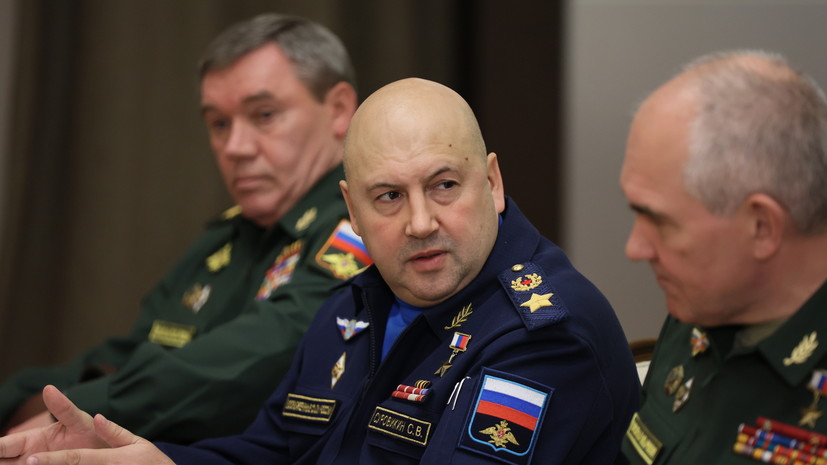Commander-in-Chief of the Aerospace Forces of Russia, General of the Army Sergei Surovikin, has been appointed commander of the troops in the zone of the special operation in Ukraine, the Russian Defense Ministry said.
“By the decision of the Minister of Defense of the Russian Federation, General of the Army Sergey Surovikin was appointed commander of the joint group of troops (forces) in the area of the special military operation,” said the official representative of the department, Lieutenant General Igor Konashenkov.
Military biography
Sergey Vladimirovich Surovikin was born in 1966 in Novosibirsk.
He entered military service in 1983, and in 1987 he graduated from the Frunze Omsk Higher All-Arms Command School with a gold medal.
He went from commander of a motorized rifle platoon to commander of a company and deputy commander of a motorized rifle battalion.
In 1995 he graduated with honors from the Frunze Military Academy, by 1999 he had taken the position of chief of staff - deputy commander of the 201st motorized rifle division.
Surovikin served in Tajikistan during the armed conflict in this republic, took part in the second Chechen war.
In 2002 he graduated with honors from the Military Academy of the General Staff of the RF Armed Forces.
Russian Defense Minister Sergei Shoigu and Commander-in-Chief of the Russian Aerospace Forces Sergei Surovikin
RIA News
© Press Service of the Ministry of Defense of the Russian Federation
Since 2005, he has been chief of staff, and since April 2008, commander of the 20th Guards Combined Arms Army.
Until January 2010, he was chief of the Main Operational Directorate of the General Staff, after which he was appointed first deputy commander of the Volga-Urals, and then the Central Military District.
In 2012, he headed the working group on the creation of the military police of the Ministry of Defense, in 2013 he became the commander of the troops of the Eastern Military District.
At the end of October 2017, Sergei Surovikin was appointed Commander-in-Chief of the Russian Aerospace Forces.
Surovikin twice led the grouping of Russian troops in Syria: in 2017 and 2019.
In August 2017, he reported that in just three months, the Russian military managed to destroy more than 8,000 terrorists on the territory of the republic.
For the courage and heroism shown in the performance of military duty in Syria, he was awarded the title of Hero of the Russian Federation.
In August 2021, Surovikin received the rank of army general.
Air control
Back in 2020, Surovikin drew attention to the growing tension and military development of the territory of Ukraine by Western countries.
“Flights of any military aviation over the territory of Ukraine do not contribute to defusing tension in the region,” he stressed at a briefing for foreign attachés.
Then the general clarified that the Ukrainian fighters interacted with the American B-52H strategic bombers that flew over the territory of the Netherlands, Germany, Poland and Ukraine.
The Commander-in-Chief of the Aerospace Forces noted that Russia will continue to monitor activity near the country's borders.
“The Aerospace Forces will continue to monitor the situation near the Russian borders in order to take timely measures to ensure the security of the Russian Federation,” he said.
Commander-in-Chief of the Russian Aerospace Forces General of the Army Sergei Surovikin
RIA News
© Alexey Druzhinin
Commenting on the flights of the B-52N bombers near the borders of Russia and their practice of strikes on the territory of the Russian Federation, Sergey Surovikin called them hostile and provocative.
“We believe that working out the issues of combat use of strategic aircraft in the immediate vicinity of the state border of the Russian Federation is hostile and provocative,” the military leader emphasized.
Special operation in Ukraine
In June of this year, the Ministry of Defense reported that Sergei Surovikin was in command of the Southern Group of Forces as part of a special operation in Ukraine.
The military department then noted that under his leadership, the defeat of the encircled grouping of the Armed Forces of Ukraine in the mountain cauldron was completed.
Recall that during the NMD, the Russian military took control of the Azov part of the Zaporozhye region and the Kherson region.
At the end of September, these regions, together with the Donetsk and Lugansk People's Republics, became part of the Russian Federation following the results of referendums.

